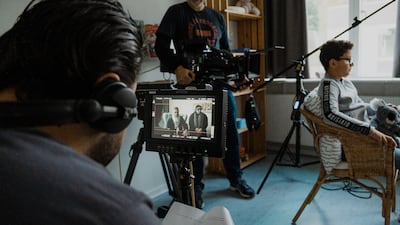The Danish government adopted 13,500 children last year because their parents, locals and immigrants, were unfit to raise them. The policy is more prevalent in Scandinavian countries than anywhere else in the world.
My Toy, a short Danish film written and directed by Syrian filmmaker Mazen Haj Kassem, follows three fictional children — Sarah and Mette, two Danish girls, and Salem, a boy from an immigrant Palestinian family — all being escorted to supervised meetings with the biological parents from whose care they were taken. All three children are 10 years old.
“This is a really rampant phenomenon, particularly in Scandinavian countries. Last year, seven children a day were adopted by the government,” Kassem tells The National.
“This is sometimes by force, because their parents use drugs or are too young. Sometimes, the parents themselves take their children to the state because they can’t care for them any longer.
“It's also an issue that hasn't been fictionalised before or really talked about on an international level. It's usually depicted in local documentaries in Danish.”
Driving the eight-minute film’s narrative is a pervasive question, the elephant in the room so to speak: whether the government is a villain or a saviour for rehoming the children despite their families’ distress.
Viewers confronted with the obvious failures of the two families (one Arab and one Danish) portrayed in the film, are left to decide how important blood ties are when it comes to raising a child.
The government’s case is silently defended by the fact that Mette’s parents do not even show up to the meeting and she is left awkwardly drinking a glass of orange juice with a social worker.
As the film progresses, the audience is also confronted with an angry outburst from Salem’s Palestinian father, who becomes verbally abusive when he finds out that his son has forgotten how to speak Arabic.
Even during his brief meeting with his estranged son, Tarek, played by Egyptian actor Hassan El Sayed who Kassem had to coach on how to deliver a convincing Palestinian accent, cannot help but force ideals on him about toxic masculinity.
It is also revealed that Sarah’s father abused drugs, which resulted in her being taken away.
“I wanted to make a balanced film, so it is neither Danish nor is it Arabic, but aims to show how even different ethnicities can be subjected to the same essential human experiences,” Kassem says.

At the heart of the tension that is palpable throughout the film is a tug-of-war between two opposing forces: modernity versus tradition, state versus individual and East versus West.
The children, whose lives are most affected by these struggles, are also the least tuned into them. Their attitudes towards their parents veer between resentful and despondent throughout the film.
Their loyalties seem to be only to each other, as they are also coldly polite to the government workers.
Their strong bond is portrayed in the first scene through their passing of a worn-out stuffed koala bear toy — the film’s namesake and the focal point of the children’s interior lives — between them as they make their way to the meeting.

The toy is later used to stage a fight between Salem and Sarah, both of whom have had enough of their parents and had agreed beforehand that they would start a false argument as their exit strategy if the situation became unbearable.
“What I wanted to show in the scenes with the toy was that the children have interior lives of their own, they know what they need and they had come to a decision that they do not want to keep living with their parents,” Kassem says. “This is undoubtedly a sad note to end the film on. It starts on a sad note and ends on a sad note. But, sadly, this is how it usually plays out in real life for many of these children.”
While they might have their basic needs met, Kassem says, children like Sarah, Salem and Mette miss out on an essential aspect of being human, namely the feeling of being loved by one’s mother and father.
At times, they grow up to become well-adjusted adults who don’t feel as though they are missing anything, Kassem says. However, in some cases, the children are taken away from parents who would have been perfectly adept at raising them.
“I have a friend whose girlfriend got pregnant, did not tell him, had the child and legally prevented him from ever seeing his son,” he says.
“In the end, she gave the son to the government because she couldn't raise him and when he was finally allowed to see his father, it was too late for them to form any real bond.”
The fact that the numbers are so much higher in Sweden, Norway and Denmark than other European countries with effective child protection mechanisms gave Kassem pause for thought while he was researching for the film.

“I think it’s because they place a great deal of importance on child rights in Scandinavian countries, the child’s experience is prioritised overall, which is something I support,” Kassem says.
“But sometimes I think they take the concept of ‘the child is always right’ to an excessive degree whereby a child will report a fight between his parents to a teacher and the very next day they are taken away from their home.”


